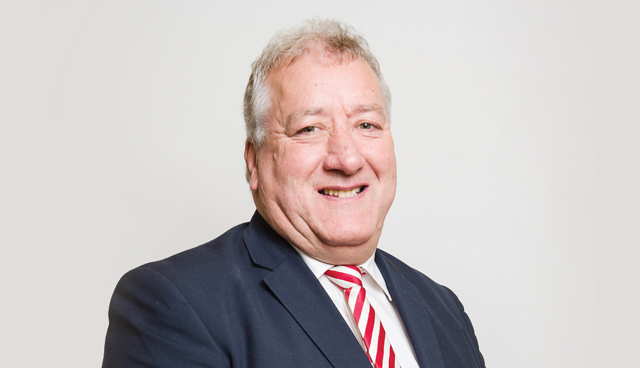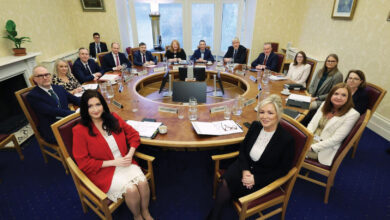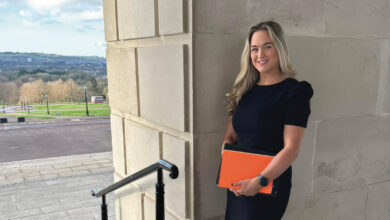All Party Group: Fair Banking and Finance

Chair of the recently launched All Party Group (APG) on Fair Banking and Finance, Pat Catney MLA discusses the origin of and potential for the new group established to help manage the financial impact of Covid-19 on Northern Ireland’s economy.
Pat Catney begins by outlining his belief that the All Party Group, officially launched in October 2020, is somewhat unique in its efforts to enable banks and the financial services sector to work closer with businesses, civic groups and government to ensure policy that sustains local enterprises, improves access to financial services and helps build a future economy.
The cross-party group with 15 members from the Northern Ireland Assembly has a remit “to put forward policy recommendations to the government to promote sustainable enterprise, business growth, and inclusive access to financial services”.
Former UK Prime Minister and the longest serving UK Chancellor of the Exchequer, Gordon Brown gave the keynote address at the official launch, which also included input from a range of senior figures, including Finance Minister Conor Murphy MLA and Co-Chair of the All Party Parliamentary Group (APPG) on Fair Banking at Westminster, Kevin Hollinrake MP.
The APG on Fair Banking and Finance is coordinated by APG Secretariat Ltd, which provides a secretariat service to the group. Executive Director Ken Bishop says that the financial impact of Covid-19 has brought a greater necessity for banks and financial services sectors to work closer with businesses, civic groups and government to ensure policy that sustains local enterprises, access to financial services and helps build a future economy.
Stressing the need for innovation in this regard, Bishop suggests the need to explore and develop new financial structures which could support the existing financial system to support “a green and inclusive recovery”.
Highlighting the job creation potential and economic benefits of Northern Ireland building a green economy, he adds that green economic development will enable Northern Ireland to create a new unique selling point. “The APG is important strategically because it facilitates not only the addressing of concerns on the business and consumer relationships with the banking and financial sector but also a basis for forward thinking and a focus on what can be achieved with collective buy-in.”
The group aims to engage equally with all stakeholders who have an interest in the strength and resilience of SMEs and the financial sector more generally, with an emphasis on providing a platform to bring these voices together to work towards implementing constructive reforms to the commercial lending market.
Officers and Members of the APG on Fair Banking & Finance Group
(Chair) Pat Catney, SDLP
(Vice-Chair) Rachel Woods, Green Party
(Treasurer) John Blair, Alliance Party
(Secretary) Cara Hunter, SDLP
Jim Allister, TUV
Clare Bailey, Green Party
Paula Bradley, DUP
Robbie Butler, UUP
Jemma Dolan, Sinn Féin
Paul Frew, DUP
Dolores Kelly, SDLP
Maolíosa McHugh, Sinn Féin
Sinead McLaughlin, SDLP
Mike Nesbitt, UUP
Claire Sugden, Independent
Catney outlines the importance of ambitions to help create a level playing field between businesses and their lenders, while also protecting the public purse.
“Businesses require a finance and banking system that allows innovation and enterprise to flourish. We’re aiming for a finance sector that truly serves the interests of the businesses that constitute the lifeblood of the economy,” says the MLA.
The core aims identified by the group are:
- helping manage the financial impact of Covid-19 on Northern Ireland’s economy;
- promoting fair access to banking and financial services;
- continuing to strengthen and balance the relationship between relevant groups and the banking/finance industries through collective group workstreams; and
- encouraging, identifying and supporting the diversification as well as the innovation of private and public finance.
Although still in its infancy, the APG has already achieved a major milestone, securing the extension of the UK Business Banking Resolution Service (BBRS) to Northern Ireland SMEs.
Catney says that on top of this, the APG has already started working with local banks and stakeholders to develop workstreams in collaboration with business communities.
One important workstream underway is the opportunity for Northern Ireland and its banking sector to “demonstrate bold leadership and play a central role in catalysing international action on climate change” ahead of the November 2021 hosting by the UK of the COP26 in Glasgow.
The APG is aiming to develop a set of policy recommendations ahead of COP26 designed to create a regulatory environment “that enables banks to play their part in financing the net-zero” transition, with evidence gathered during this period being made available to all stakeholders while also being presented at the COP26 and to the Northern Ireland Assembly.
Concluding, Catney stresses his desire to ensure that the APG is not simply a “talking shop”. Setting out his belief that the ‘neutral platform’ composition of the APG can ensure the magnification of Northern Ireland’s regional voice at Westminster and more globally, he adds: “Where an individual MLA may struggle to make change, the structure of the APG and its network of connections presents real opportunity to get into the heart of government and ensure that a common purpose approach can be heard and acted upon.”
The Northern Ireland Assembly All-Party Group on Fair Banking and Finance is cross-party group, bound by the rules set out by the Assembly. It does not have statutory powers, official status, or charitable status nor is it funded by Northern Ireland Assembly.






